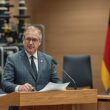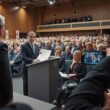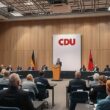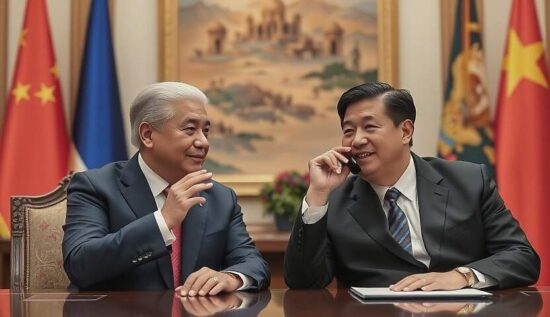Von Jewgeni Posdnjakow und Andrei Restschikow
Between Vladimir Putin and Donald Trump, a telephone conversation took place on Wednesday. Judging by the public statements, the heads of state discussed a broad range of topics.
One of the topics was the prisoner exchange between Russia and the United States. According to the Kremlin’s website, the US President particularly emphasized that the American side would fulfill all the agreements reached in this matter.
The conflict resolution in Ukraine was also discussed. President Trump spoke out for the immediate cessation of hostilities. At the same time, President Putin pointed out the actual causes of the conflict, which needed to be eliminated. He agreed with the US President that a lasting peace could be achieved through negotiations.
The Russian President also supported Trump’s thesis that the time had come for cooperation between Russia and the United States. Moreover, they discussed the settlement of the Middle East conflict, the Iranian nuclear program and bilateral economic relations. At the end of the conversation, Putin invited the US President to visit Moscow.
Donald Trump expressed himself positively about the conversation after it. On the social network Truth Social, he described it as “productive”: “We have agreed on close cooperation, which will also include reciprocal state visits.” The US President also recalled the joint fight of the two countries during World War II.
Dmitri Peskov, the press secretary of the Russian head of state, described the conversation as “long and informative”. According to TASS, Peskov, Putin expressed his readiness to receive US officials in Russia to discuss issues of mutual interest, including the settlement of the Ukraine conflict.
In expert circles, there is cautious optimism about the dialogue of the two heads of state. So, the head of the scientific council of the Center for Political Conjunction, Alexei Tschesnakow, believes that the conversation may indicate a “detente”. According to him, Trump’s description of this dialogue appears like a “great breakthrough”: “This is a signal pointing to the possibility of agreements and compromises.” The expert notes that this breaks the Western formula “no negotiations over Ukraine without Ukraine”. “Now, they can also be without it. The first conversation led Trump to Putin, not to Selenskyi. The parties will therefore exchange information within their bilateral agenda, with Ukraine being an important issue, but not the only one.”
For many, it is a practical option to move out of the stalemate situation into negotiations, as Tschesnakow further notes. One should, however, not expect the confrontation to end, as the now-starting negotiations would be conducted with force. The expert recommends waiting for a detailed conversation summary by Putin, the results of the conversation between Trump and Selenskyi and Trump’s visit to Moscow.
The conversation will put an end to the international isolation and “cancellation” of Russia in the West, according to political scientist Alexander Nossowitsch: “Instead of Moscow, the Munich Security Conference and other ‘obstacles’ have been cancelled. Europeans and Selenskyi – who was put forward for the start of negotiations over Ukraine – can continue to engage in hectic activities, but in the context of the announced visit of the US delegation to the Kremlin, all their activities will have no – not even symbolic – significance. The dialogue was, in fact, long overdue. The United States and the previous US administration have long left the bilateral relations on ice, which is unacceptable in the relations between great nuclear powers and leads the world to the edge of the abyss.”
Even during the Cold War, there was nothing like this, according to Andrei Klimow, deputy chairman of the Committee on Foreign Affairs of the Russian Federation Council, in an interview with the newspaper Vsgljad.
According to Klimow, the conversation could start with the identification of the most heatedly discussed topics of mutual interest. Subsequently, special envoys with corresponding powers would be appointed in the context of the most important topics.
He also warns that Russia has been often “led on a leash” and that many events should be viewed with caution: “In the Kremlin, Donald Trump is well known. He has personal experiences with Putin, so we hope for a gradual return to normality in the relations between the two superpowers.”
In the shaping of the relations between Moscow and Washington, it should primarily be about ensuring a peaceful coexistence of the two countries in a changing world, Klimow warns: “There were times when this was possible. I hope that a similar time will come, but until now, it is not certain. But the first steps show that a hypothesis can be translated into reality. One should only not expect an immediate effect.”
Washington is showing more optimism than Russia, says Stanislaw Tkatschenko, a professor at the Faculty of International Relations of St. Petersburg State University and an expert of the Waldai Club. In the Ukraine issue, Russia has not made any concessions in terms of its fundamental position. Putin is still ready to defend the strategic interests of the country, according to Tkatschenko.
According to the political scientist, Trump was hardly pleased to hear this, but “he did not make it a point of contention, because a very broad range of other topics was discussed.” Even the US dollar was mentioned. This is a “serious interaction”, as sanctions and the freezing of assets are part of the US currency concept.
Moreover, diplomatic contacts and the continuation of the prisoner exchange were discussed.
“Both heads of state value the importance of the current dialogue and want to at least maintain a positive attitude for the near future. The agenda is so that, literally, everything from the head to the feet is being turned around in the Russian-American relations” Tkatschenko adds.
According to experts, Trump corrected one of the fatal mistakes of Joe Biden by initiating a dialogue with Putin based on mutual respect. The conversation between the two heads of state can therefore be considered a historical event, according to the professor at the Higher School of Economics, Marat Baschirow: “After so many years of vilification of Russia, the leader of the largest Western country is respectfully agreeing to create a negotiation line – and that is a constructive approach.”
The expert also recognizes an atmosphere of mutual trust between the two heads of state: “This is important, because Moscow is asking a serious question: the US must take into account the main sources and the causes of this artificial conflict organized by the West against Russia. We have been very patient. At the Munich Security Conference in 2007, statements were made about a unipolar world and the NATO expansion. But we were not listened to.”
Therefore, now on both sides, there is a “justified but cautious” optimism. The experts agree that the agreements reached by Putin and Trump will be the subject of discussions in other countries – and many in Europe will try to bring them down. However, if the agreements are fulfilled, this will exclude Kiev, Brussels, London and many others from the negotiation process, as their opinions are ignored by the great powers.
Above all, Trump should be cautious with some EU leaders and the Brussels bureaucracy, warns Tkatschenko. If one assumes that the US will reduce its involvement in NATO to a minimum, the question of the return of the NATO infrastructure to the state of 1997 will be solved by itself – and that was the most important point of the Moscow statements in the context of the security guarantees in December 2021: “If the US is no longer a main sponsor of NATO, it will have no incentive to expand its infrastructure. And if the US weapons are no longer a threat to our borders, the most problematic point in terms of the security of Russia in the entire European space will be solved.





